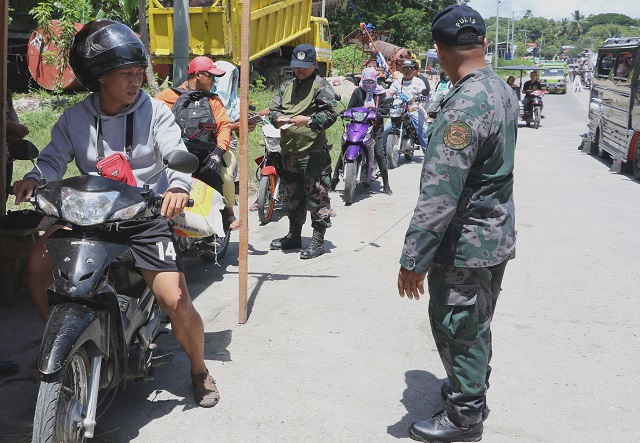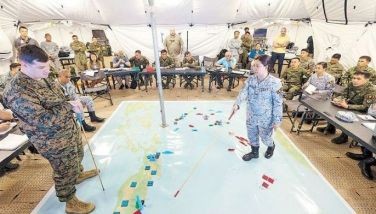How martial law is being implemented in Mindanao's cities

Personnel of the Cotabato City police office screen motorists at a checkpoint into the city from Datu Odin Sinsuat town in Maguindanao. JOHN UNSON, file
MANILA, Philippines — Congress on Wednesday overwhelmingly approved President Rodrigo Duterte’s request to extend the imposition of martial law in Mindanao until December 31, 2018.
The result of the joint session of Congress—the Senate voted 14-4 and the House voted 226-23—to extend did not come as a surprise as the Duterte-led PDP-Laban controls the majority blocs of both houses.
READ: Congress approves one-year martial law extension in Mindanao
In his letter addressed to Congress, Duterte cited continuing threats of ISIS-inspired extremists, local terrorist groups and the New People’s Army—a new ground—in seeking an extension of the declaration.
"A further extension of the implementation of martial law and suspension of the privilege of the writ of habeas corpus in Mindanao will help [...] quell completely and put an end to the ongoing rebellion in Mindanao and prevent the same from escalating to other parts of the country," the president wrote.
Majority of lawmakers from Mindanao expressed support for the prolonging the already extended martial law, citing that military rule is needed to protect the constituents and secure rehabilitation efforts in Marawi.
House Speaker Pantaleon Alvarez (Davao del Norte, 1st district) said that residents actually feel safer under military rule.
In the past six months of martial law in Mindanao, polls conducted across the country showed positive support from residents of Mindanao for the declaration, with just two of ten Mindanaon respondents disagreeing with the initial extension until the end of 2017.
READ: Do Mindanaons support martial law? Surveys suggest they do
But James Gonzales, Amnesty International’s Director for Southeast Asia and the Pacific, said that since the military rule was declared in Mindanao, civilians have faced human rights abuses at the hands of the military as well as of Islamic State-inspired militants.
Amnesty accused the military of using torture and ill-treatment of people in their custody especially those who were trying to escape the fighting.
Below are the measures that some cities in Mindanao have been implementing since martial law was declared on May 23 through Proclamation 216, within hours of the Maute attack on the capital of Lanao del Sur.
READ: Duterte declares martial law in Mindanao
Davao City
Mayor Sara Duterte-Carpio, placed the city on a “hold-and-secure situation,” which is enforced when the threat comes from outside.
Davao is some 250 kilometers from Marawi City in Lanao del Sur.
The president's daughter had earlier declared a lockdown, where all entry points to the city were blocked.
The Davao City government then released guidelines for Davao residents while martial law is in effect.
Under the guidelines, minors are “extremely discouraged to go out of their residences except when accompanied by adults.” Residents were encouraged to conduct personal and religious activities in the daytime.
Travel to and from Davao City and in other places in Mindanao, as well as travellling via motorcycle convoys, is discouraged unless there is an urgent matter that needs to be attended to.
Checkpoints are mounted by both the Armed Force of the Philippines and Philippine National Police personnel, requiring updated vehicle registration papers, driver’s licenses, valid personal identification documents and valid and existing licenses for guns.
The Communist Party of the Philippines said that Carpio was taking advantage of her father’s declaration of martial law in Mindanao to enforce “anti-democratic measures” such as the restriction of people’s freedom.
READ: Davao City releases 30-point guideline under martial law
Iligan City
Evacuees who escaped the firefighting in Marawi sought refuge in Iligan City, some 38 kilometers away from the war-torn city.
Checkpoints by both the police and military on different entry and exit points in Iligan have been strict, requiring passengers in almost every vehicle to come out for inspection.
The city government first imposed a 10 p.m. to 4 a.m. curfew on May 24, a day after the Marawi attack. On May 3, it was adjusted to 9 p.m. to 5 a.m., which caused a huge blow to nighttime business. Establishments close an hour before the start of curfew.
The city government then shortened the curfew to only five hours from 11 p.m. to 4 a.m. on June 28.
Zamboanga City
Local authorities tightened security in the city following the start of siege in Marawi through thorough inspection and search.
The ‘No ID, No Entry’ policy was implemented to prevent the entry of terrorists in the city.
In a resolution approved last June, the Regional Peace and Order Council in Region 9 (Zamboanga Peninsula) backed the declaration of martial law and the proposal for a national identification system, saying these would address security concerns in southern Philippines.
Cotabato City
The city government also enforced the “No ID, No Entry” scheme to shut possible access into the city of members of terrorist groups. Cotabato City is only four hours drive from Marawi City.
Police and soldiers manning checkpoints search for peoples’ IDs and driver’s licenses.
Task Force Cotabato was formed to secure the city. Personnel of the 5th Special Forces Battalion are helping guard the 37 barangays from criminals and terrorists.
Mayor Cynthia Guiani-Sayadi took the implementation of martial law in Mindanao to as an opportunity to intensify the local government's campaign against illegal drugs.
Marawi City
The Philippine National Police is enforcing a curfew in the city, which has been liberated from Maute terrorists but has yet to be fully cleared of IEDs and unexploded ordnance, from 8 p.m. to 5 a.m. Superintendent Ebra Moxsir, city police chief, said the curfew starts at 8 p.m. so residents of the predominantly Muslim city can attend their last evening prayer at 7:10 p.m. and have time to go home.
Lamitan City
Lamitan in Basilan has a "No ID, No Entry" policy.
- Latest
- Trending



























